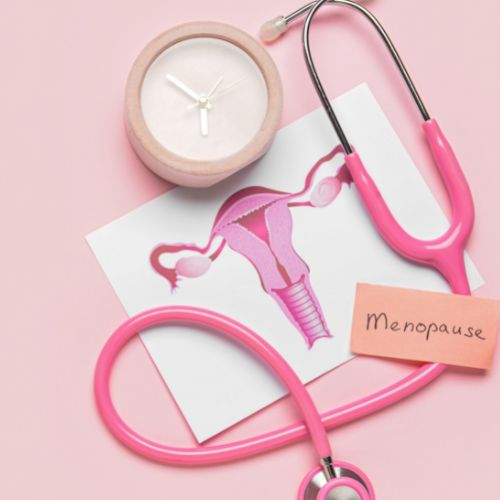Menopause
What is Menopause?
Menopause is the permanent end of menstrual cycles, and can be defined by the cessation of periods for 12 months or more without any other cause. Unless due to surgery to remove the ovaries, this is a natural process, but it can still cause many troublesome symptoms that interfere with daily functioning.
- Symptoms include hot flashes, mood swings, insomnia, weight gain, skin/hair changes, excess hair growth, and bone loss.
A combination of the report of your last period, symptoms, age, and sometimes a blood test can establish the diagnosis of menopause.
There are both hormonal and non-hormonal ways to treat the symptoms of menopause
- Hormone replacement therapy (HRT) means replacing the hormones that are no longer being produced during by the menstrual cycle-estrogen and progesterone. These come in various formulations such as pills, creams, and patches. Relief of your symptoms is the most important factor in determining the right formulation and dosage of these medications. We will discuss important risks you should be aware of when it comes to HRT and whether it is right for you.
- Non-hormonal therapy-there are various medications that can address particular symptoms of menopause. For example, there are sleep aids for insomnia, antidepressants for mood disorders, and osteoporosis medications for bone loss. These can be prescribed either in combination or instead of HRT.

Conditions Addressed
Adrenal
Osteoporosis
Pituitary
Thyroid
Parathyroid
Polycystic Ovarian Syndrome (PCOS)
Menopause
[vc_row content_width=”grid”][vc_column][vc_column_text el_class=”justify-text”]
Menopause is the permanent end of menstrual cycles, and can be defined by the cessation of periods for 12 months or more without any other cause. Unless due to surgery to remove the ovaries, this is a natural process, but it can still cause many troublesome symptoms that interfere with daily functioning.
Menopause
- Symptoms include hot flashes, mood swings, insomnia, weight gain, skin/hair changes, excess hair growth, and bone loss.
- Diagnosis: a combination of the report of your last period, symptoms, age, and sometimes a blood test can establish the diagnosis of menopause.
- Treatment-there are both hormonal and non-hormonal ways to treat the symptoms of menopause
- Hormone replacement therapy (HRT) means replacing the hormones that are no longer being produced during by the menstrual cycle-estrogen and progesterone. These come in various formulations such as pills, creams, and patches. Relief of your symptoms is the most important factor in determining the right formulation and dosage of these medications. We will discuss important risks you should be aware of when it comes to HRT and whether it is right for you.
- Non-hormonal therapy-there are various medications that can address particular symptoms of menopause. For example, there are sleep aids for insomnia, antidepressants for mood disorders, and osteoporosis medications for bone loss. These can be prescribed either in combination or instead of HRT.
